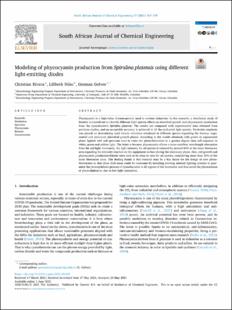Modeling of phycocyanin production from Spirulina platensis using different light-emitting diodes
...
Niño, Lilibeth | 2017-07
Phycocyanin is a high-value chromo-protein used in various industries. In this research, a simulation study of
kinetics is carried out to identify different light spectra effects on microbial growth and phycocyanin production
from the cyanobacteria Spirulina platensis. The results are compared with experimental data obtained from
previous studies, and an acceptable accuracy is achieved in all the evaluated light spectra. Particular emphasis
was placed on determining axial kinetic velocities simulated at different spectra regarding the latency, exponential and stationary microbial growth phases. According to the results obtained, cells grown in exponential
phase lighted with red spectrum tend to resist the photo-limitation to a greater degree than cell exposure to
white, green and yellow light. The latter is because phycocyanin allows a more excellent wavelength absorption
from the red light. Contrarily, the light intensity for all spectra is reduced by around 80% at the inner bioreactor
area regarding the intensity reached on the equipment surface during the stationary phase. Also, cell growth and
phycocyanin production kinetic rates tend to be close to zero for all spectra, considering more than 50% of the
inner bioreactor zone. This finding found in this research may be a key factor for the design of new photobioreactors so that these dark areas could be overcome by installing rotating internal lighting systems to guarantee the photosynthesis process of cyanobacteria in all regions of the bioreactor and thus avoid the phenomenon
of photo-limitation due to low light intensities.
LEER










